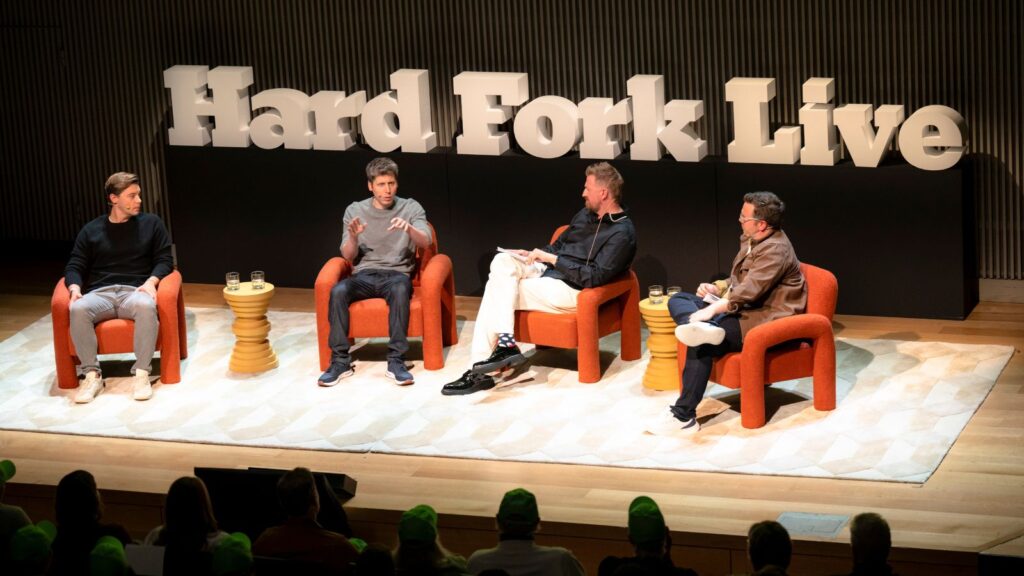OpenAI CEO Sam Altman has sharply criticised The New York Times over a recent development in a copyright infringement lawsuit, accusing the publisher of trying to undermine user privacy by demanding that the ChatGPT-maker retain consumer and API customer data.
“The New York Times, one of the great institutions, truly, for a long time, is taking a position that we should have to preserve our users’ logs even if they’re chatting in private mode, even if they’ve asked us to delete them. Still love The New York Times, but that one we feel strongly about,” Altman said during a live interview in San Francisco, California, US, with Hard Fork, the tech podcast from The New York Times.
The CEO was accompanied onstage by Brad Lightcap, OpenAI’s chief operating officer, with podcast hosts NYT columnist Kevin Roose and tech journalist Casey Newton. The two OpenAI executives abruptly came up onstage before being introduced.
“This is more fun that we’re out here for this,” Altman said to the hosts. “Are you going to talk about where you sue us because you don’t like user privacy?” he added moments later in a jab at NYT.
However, the rest of the 33-minute conversation went on smoothly with Altman and Lightcap responding to questions on a slew of AI-related issues including talks with US President Donald Trump, impact of AI on jobs, souring relationship with Microsoft, Meta’s all-out push toward artificial superintelligence (ASI), and more.
Here are the key highlights from the interview.
How AI is affecting jobs
OpenAI COO Brad Lightcap said that he agreed with predictions about AI changing jobs forever. “I think that there is going to be some sort of change. I think it’s inevitable. I think every time you get a platform shift, you get the changing job market,” he said.
“In 1900, 40 per cent of people worked in agriculture, it’s 2 per cent today […] We work with businesses every day to try and enable people to be able to use the tools at the level of 20-year-olds that come into companies and use them with a level of fluency that far transcends anyone else at those organizations but we see it as our mission to make sure that people know how to use these tools and and to drive people forward,” he said.
Story continues below this ad
“I do think there will be areas where some jobs or whole categories of jobs will go away and any job that goes away, even if it’s good for society and the economy as a whole, is extremely painful at that moment. But in many more cases I think we will find that the world is significantly under-employed and wants way more code than can get written right now,” Altman said.
Both of them disagreed with Anthropic CEO Dario Amodei’s prediction that AI will eliminate 50 per cent of entry-level white-collar jobs in the next five years.
“The entry-level people will be the people that do the best here. They’re the most fluent with the tool, they’re the most liable to think of things in new ways. New jobs will be better and people will have better stuff. The take that half the jobs are going to be gone in a year or two years or 5 years or whatever is just not how society really works even if the technology were ready for that. The inertia of society will be helpful in this case,” Altman said.
Relationship with Microsoft
When asked about the current status of OpenAI’s relationship with Microsoft, Altman said, “In any deep partnership, there are points of tension and we certainly have those. We’re both ambitious companies, so we do find some flashpoints, but I would expect that it is something that we find deep value in for both sides for a very long time to come.”
Story continues below this ad
He added that he had a “super nice call” with Microsoft CEO Satya Nadella this week where they discussed the future of their working relationship.
Microsoft is OpenAI’s biggest investor and has pumped billions of dollars into the AI startup. However, recent reports have suggested that ties between the two companies have soured with the partners negotiating a new contract. On these reports, Altman asked, “Do you believe that, when you read those things?”
Mark Zuckerberg’s AI push
When asked whether Meta CEO’s play toward building AI systems that are superintelligent was a recruiting strategy, Lightcap quipped, “I think [Zuckerberg] believes he is superintelligent.”
Competition for AI talent has reached a feverish pitch as superstar researchers are being courted like professional athletes on the belief that individual contributors can make or break companies.
Story continues below this ad
In a recent podcast appearance, Altman had said that Meta offered OpenAI employees bonuses of $100 million to recruit them, as the social media giant looks to ramp up its AI strategy.
Donald Trump’s outlook on AI
Based on productive talks he has had with Donald Trump about AI and its geopolitical and economic importance, Altman said that the US president “really gets it. I think he really understands the importance of leadership in this technology.”
At the beginning of the year, Trump announced what might be the most ambitious infrastructure project in the country’s history since NASA’s first missions to the moon.
This initiative known as the Stargate Project is a joint venture among OpenAI, Microsoft, Nvidia, Arm, Oracle, Softbank, and other corporate partners aiming to invest $500 billion to build out AI infrastructure such as data centers, energy plants, power lines, and more in the US over the next four years.
Story continues below this ad
The first data centre under the project is already under construction in Texas and will be dedicated to training OpenAI’s next AI models.
AI safety and regulation
When asked about the dangers of ChatGPT, especially when used by people to discuss conspiracy theories or suicide with the chatbot, Altman said, “We don’t want to slide into the mistakes that I think the previous generation of tech companies made by not reacting quickly enough.”
“However, to users that are in a fragile enough mental place, that are on the edge of a psychotic break, we haven’t yet figured out how a warning gets through,” the OpenAI CEO added.
On AI regulation, Altman said, “As these systems get quite powerful, we clearly need something. And I think something around the really risky capabilities and ideally something that can be quite adaptive and not like a law that survives 100 years.”
Story continues below this ad
“I have become a bit more, jaded isn’t the right word, but it’s something in that direction, about the ability of policymakers to grapple with the speed of technology,” he further said.



